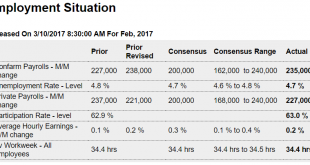from Lars Syll Causal modeling attempts to maintain this deductive focus within imperfect research by deriving models for observed associations from more elaborate causal (‘structural’) models with randomized inputs … But in the world of risk assessment … the causal-inference process cannot rely solely on deductions from models or other purely algorithmic approaches. Instead, when randomization is doubtful or simply false (as in typical applications), an honest analysis must consider...
Read More »Payrolls, Gasoline demand
Better than expected, but not nearly enough to even begin to conclude that the multi year deceleration has reversed: This chart does not tell me this multi year downtrend has been broken: And growth of the household survey is down to 1% year over year: Participation seems to be settling in at depressed levels not seen since before women started entering the labor force: Compare the recent gains with those of prior cycles: Above 0 has coincided with recession: Obama the Tea...
Read More »Open thread March 10, 2017
India: cash comes back
What’s happening in India? The people are clearly rolling back the recent move of the Indian government to basically abolish the cash economy: the amount of cash is, at the moment of writing this, increasing at a hyperinflation rate of 8,5% per fortnight (according to the Reservebank of India data). But the amount of cash is still way below last years’level. Bank deposits are 12% higher than last year but have been flat since December. The question is why cash was abolished. Read here,...
Read More »A Non-Distortionary Tax
Dead people aren’t allowed to drive. They aren’t allowed to vote. They aren’t allowed to testify in court, acquire weaponry, check out books from the library or acquire a pilot’s license. This makes sense. After all, dead people don’t have a functioning brain. As a result, we wouldn’t want them driving or voting or wandering around the local library. But there is one thing dead people are allowed to do. They’re allowed to dispose of assets, or rather,...
Read More »Hammer time
from David Ruccio Millions of workers have been displaced by robots. Or, if they have managed to keep their jobs, they’re being deskilled and transformed into appendages of automated machines. We also know that millions more workers and their jobs are threatened by much-anticipated future waves of robotics and other forms of automation. But mainstream economists don’t want us to touch those robots. Just ask Larry Summers. Summers is particularly incensed by Bill Gates’s suggestion that...
Read More »Trumponomics
Trump’s America First economic strategy looks a lot like the import substitution economic development strategy that was so popular several decades ago—notably in Latin America and South Asia.. But it only had limited success, especially compared to the export led growth strategy followed in East Asia. Import substitution tended to produce fragmented, inefficient and low productivity industries protected from foreign competition by high tariffs and other...
Read More »Economics — confusing mathematical masturbation with intercourse between research and reality
from Lars Syll There’s no question that mainstream academic macroeconomics failed pretty spectacularly in 2008 … Many among the heterodox would have us believe that their paradigm worked perfectly well in 2008 and after … This is dramatically overselling the product. First, heterodox models didn’t “predict” the crisis in the sense of an actual quantitative forecast. This is because much of heterodox theory is non-quantitative. Basically, people write down English words explaining their...
Read More »Mtg apps, ADP payrolls, Wholesale trade, Atlanta Fed GDP forecast, Tax refund delays
The growth rate has slowed and the level of apps remains depressed: Nice move up. This is just a forecast of Friday’s number: Highlights The February employment report looks to be a blockbuster based on ADP’s estimate for giant growth of 298,000 in private payrolls. This would be the biggest gain since October 2015 and one of the very largest of the cycle. ADP isn’t always followed closely but its call last month for outsized growth in January payrolls did prove correct....
Read More »The new trade agenda: deals that promote equality rather than inequality
from Dean Baker With the Trans-Pacific Partnership now definitely dead and Donald Trump pushing for a renegotiation of NAFTA, many progressives are looking for a fundamental re-examination of trade deals. As supporters of international cooperation rather than narrow nationalists, progressives have often felt uncomfortable opposing trade deals. While there is no reason to be defensive about opposing trade deals that favored business interests at the expense of workers, consumers, and the...
Read More » Heterodox
Heterodox






